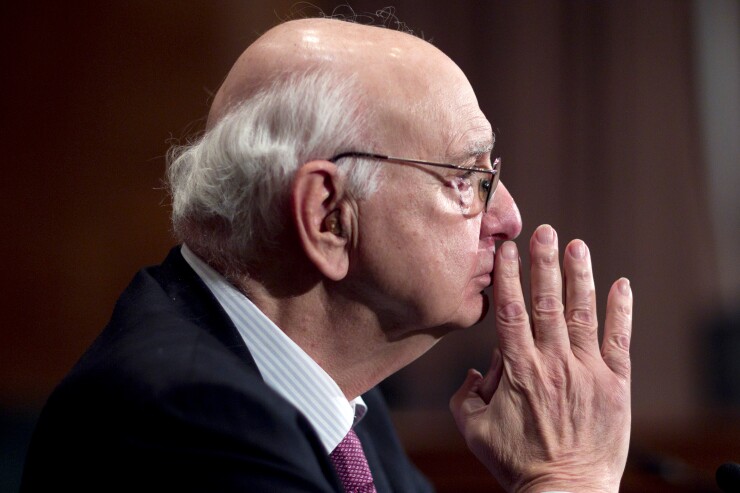The recent revision of Volcker Rule limits on banks' ability to speculate with their own capital has cost regulators a meaningful supporter: Paul Volcker.
The former Federal Reserve chairman, who championed the restrictions while serving as an adviser to President Barack Obama after the 2008 financial crisis, said regulators have used "simplification" as an excuse to weaken the rule's core concepts. Agency chiefs were pushed to make the changes by "well-compensated industry lobbyists," he wrote to current Fed chief Jerome Powell in an Aug. 20 letter, a copy of which was obtained by Bloomberg News.
"The new rule amplifies risk in the financial system, increases moral hazard and erodes protections against conflicts of interest that were so glaringly on display during the last crisis," Volcker, 92, wrote of the overhaul unveiled by regulators last month.

Regulators appointed by President Trump rewrote the Dodd-Frank Act rule in a way that redefines how banks determine what short-term trades are banned, and they're also working to relax restrictions on banks' stakes in private equity and hedge funds. The changes have been formally approved by two of the five agencies that must sign off. The Fed has yet to act.
"I fully support the simple idea behind the Volcker Rule," Powell said in a response to Volcker dated Sept. 5. "But it has been quite challenging to execute this sensible idea within the statutory framework."
Powell added, "Contrary to some reports, the universe of trades outlawed by the original 2013 Volcker Rule remains generally the same with the recent modifications."
Volcker, who has no direct influence over regulation, founded the Volcker Alliance "to advance effective management of government." He said in his letter that he favored simplifying the rule, but that the new version narrows the trading limits in ways that are "far afield" from mere simplification.
The aggressive campaign of industry groups to ease the rule "serves as a reminder of the insidious nature of lobbying in regulation and should trouble anyone concerned with the eroding public trust in government," Volcker said.
Bank Policy Institute President Greg Baer had praised the changes as helping to "reduce the incidental damage the original rule has done to responsible banking activity and legitimate market-making activity, and the massive and needless compliance costs it imposed."
Volcker said industry complaints that the limits weakened market liquidity and blunted economic growth haven't been credible. Bank profits and lending are strong, he said, and positive economic results belie justification for making the Volcker Rule easier on banks.





